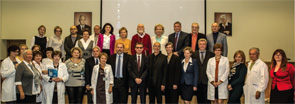
On Oct. 6, 2014, Moscow hosted the first collaborative symposium of the Russian American Consortium for Excellence in Rheumatology (RACER) at the VA Nasonova Research Institute of Rheumatology. The daylong seminar attended by rheumatologists and immunologists from Russia and its neighbors marked a new beginning in collegiality of the counterparts.
Eugene L. Nasonov, MD, DMSc, director of the National Institute of Rheumatology (NIR) and president of the Association for Russian Rheumatologists (ARR), chaired the symposium and led with a historical review of achievements in the field and the formation of organized rheumatology in Russia. He highlighted that the last meeting of Russian and American rheumatologists was conducted in 1990.
“Friendship, cooperation and love for rheumatology—without these three components, we would be unable to develop our specialty,” posited Dr. Nasonov.
Hot Topics
Other key Russian lecturers included Dmitry Karateev, MD, PhD, DMSc, and deputy director of the NIR, who reviewed treat-to-target concepts. The Russian experience in the treatment of systemic vasculitis was characterized by TE Beketov, PhD.
E.A. Halushko, MD, described the formation and development of the Russian postgraduate education in the field of rheumatology. Available data suggest that there is one rheumatologist in Russia per 100,000 people with rheumatic disease. To improve this dynamic, Halushko outlined a program of “Lifelong Education” for rheumatology that is in development. It would consist of standard education, workshops and conferences, and remote online education.
U.S. symposium faculty included Leonard Calabrese, DO, chairman of the R.J. Fasenmyer Center for Clinical Immunology, Cleveland Clinic Foundation, and co-chair of RACER with Dr. Nasonov, and Paul Caldron, DO, MBA, of Arizona Arthritis and Rheumatology Associates PC.
Dr. Calabrese presented the modern constructs of rheumatoid arthritis management based on conceptual pathophysiology, as well as the continuously evolving frontier of management of systemic vasculitis. He subsequently moderated a lively, interactive discussion on risk assessment via individual challenging clinical cases, which illustrated various complications and associations, including hepatitis B and C, HIV and other infectious diseases. The cases were presented by Drs. E. Luchikhina, L. Ananieva, T. Reshetnyak and S. Soloviev of the ARR.
“Times have changed—and changed dramatically,” concluded Calabrese, summing up the comments on therapeutic strategy.
Dr. Caldron provided insights on the deployment of the rheumatology workforce in the U.S. and illustrated the dynamics of rheumatology private practice in a market economy. After contrasting Russian nationalized and American private sector healthcare delivery systems and their current shortfalls among other developed countries, Dr. Caldron compared the drivers of contemporary healthcare changes in the two societies that seem to be pointing toward the same targets. The ultimate discussion question: “Is fee-for-service good or evil?” punctuated the need for understanding the balance necessary to sustain quality and value while motivating productivity.

